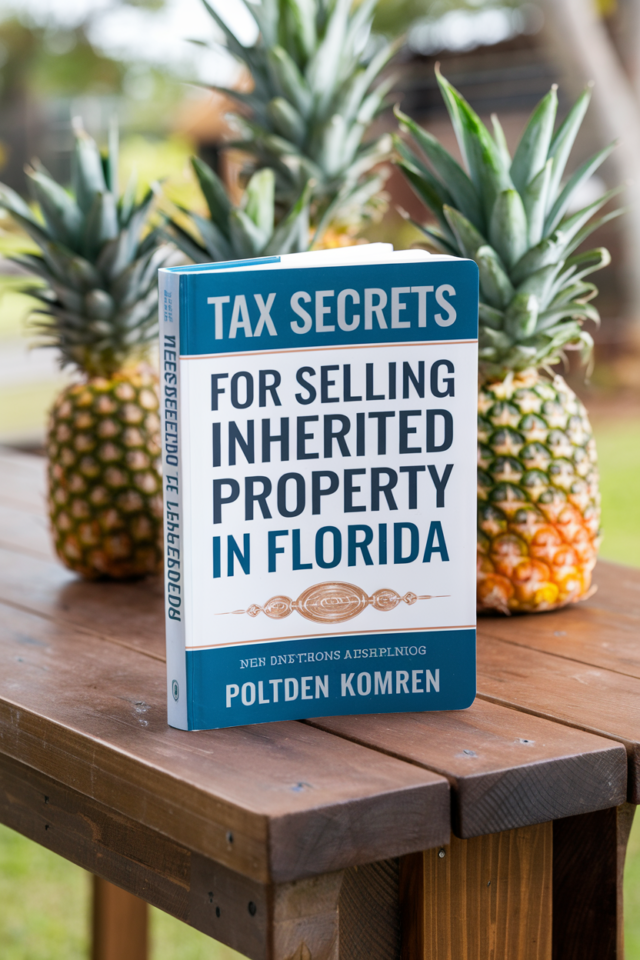Inheriting property can significantly impact your financial situation, and understanding the tax implications is crucial for effective financial planning. This article delves into the tax considerations when selling inherited property in Florida, focusing on a scenario involving a mother and her nephew.

Table of Contents
Stepped-Up Basis: A Key Concept
When you inherit property, you typically receive a stepped-up basis, which adjusts the property’s cost basis to its fair market value at the time of the original owner’s death. This adjustment can greatly reduce capital gains tax liability upon sale. For example, if your mother inherits a home, her cost basis becomes the property’s fair market value on the date of her mother’s death. Selling the property soon after inheriting it may result in little to no capital gains tax due to this stepped-up basis.
Capital Gains Tax Calculation
Capital gains tax is calculated on the difference between the sale price and the stepped-up basis—not the original purchase price. Here’s how it works:
- Fair market value at inheritance: $300,000
- Sale price: $320,000
- Taxable gain: $20,000
In this example, your mother would owe capital gains tax only on the $20,000 increase in value since inheriting the property.
Tax Rates and Income Considerations
The capital gains tax rate depends on your mother’s total taxable income for the year. As a retiree on Social Security, her income may be lower, which could reduce her tax rate. The long-term capital gains tax rates for 2024 are:
- 0% for single filers with taxable income up to $44,625
- 15% for taxable income between $44,626 and $492,300
- 20% for taxable income above $492,300
Your Nephew’s Tax Situation
Your nephew’s situation is more complex. Since he was given a one-third interest in the property after your mother inherited it, his cost basis may differ. He might owe capital gains tax on the entire amount he receives from his share of the sale, minus any sale-related expenses. If he has other income that places him in a higher tax bracket, his tax liability could be substantial.
Strategies to Minimize Tax Impact
Here are some strategies that might help reduce the overall tax burden:
- 1031 Exchange: If your nephew plans to invest in another property, a 1031 exchange allows him to defer capital gains taxes by reinvesting the proceeds into a similar property.
- Installment Sale: Selling the property in installments over multiple years can spread out the tax liability, potentially lowering the tax rate in any given year.
- Offsetting Gains: If your nephew has capital losses from other investments, he can use them to offset the gains from the property sale.
- Charitable Donation: Donating a portion of the proceeds to charity can provide a tax deduction, reducing taxable income.
Florida-Specific Considerations
Florida does not impose a state income tax, which benefits both your mother and nephew. However, they must still report the sale on their federal tax returns.
Documentation and Professional Advice
Maintaining thorough documentation is essential:
- Property Valuation at Inheritance: Keep records of the property’s fair market value at the time of inheritance.
- Improvements and Expenses: Document any improvements made to the property and all expenses related to the sale.
Consulting a tax professional experienced in Florida real estate and inheritance laws is highly recommended to navigate this complex situation effectively.
Conclusion
While your mother’s tax liability may be minimal due to the stepped-up basis, your nephew could face significant tax consequences. Careful planning and professional guidance can help minimize the overall tax impact of selling the inherited property.
Frequently Asked Questions
Q: What is a stepped-up basis?
A: A stepped-up basis is the adjustment of an inherited asset’s value to its fair market value at the original owner’s death.
Q: How is capital gains tax calculated on inherited property?
A: It’s calculated on the difference between the sale price and the property’s stepped-up basis at the time of inheritance.
Q: Does Florida have a state income tax on property sales?
A: No, Florida does not have a state income tax, including on property sales.
Q: What are the federal capital gains tax rates for 2024?
A: The rates are 0%, 15%, and 20%, depending on the taxpayer’s total taxable income.
Q: How can a 1031 exchange benefit someone selling inherited property?
A: It allows the seller to defer capital gains taxes by reinvesting the proceeds into a similar property.
Q: What documentation is important when selling inherited property?
A: Records of the property’s value at inheritance, improvements made, and all sale-related expenses.
Q: Can capital losses offset gains from an inherited property sale?
A: Yes, capital losses from other investments can offset gains from the property sale.
Q: How does gifting a portion of the property affect the tax basis?
A: The gifted portion typically has a different basis than the inherited portion, which can affect tax liability.
Q: Are there exclusions for capital gains on inherited property?
A: Unlike a primary residence, there is no specific exclusion for capital gains on inherited property.
Q: How might Social Security income affect taxes on the property sale?
A: It could increase overall taxable income, potentially affecting the capital gains tax rate.
Q: What is an installment sale, and how can it help with taxes?
A: An installment sale spreads income over multiple years, potentially reducing the tax impact in any single year.
Q: Are there special considerations for selling inherited property quickly?
A: Yes, selling soon after inheritance often results in minimal capital gains due to the stepped-up basis.
Q: How does the holding period affect capital gains on inherited property?
A: Inherited property is considered long-term property, regardless of how long it’s held before selling.
Q: Can improvements to the property affect the tax basis?
A: Yes, the cost of improvements can be added to the stepped-up basis, reducing the taxable gain.
Q: What role does the executor play in the sale of inherited property?
A: The executor values the property and manages its sale if it’s part of the estate.
Q: How can charitable donations reduce tax liability on property sales?
A: Donating part of the proceeds can provide a tax deduction, offsetting some capital gains.
Q: Are special tax forms required for reporting the sale of inherited property?
A: The sale is reported on Schedule D of Form 1040; additional forms may be needed depending on circumstances.
Q: How does co-ownership affect tax liability when selling inherited property?
A: Each co-owner is responsible for their share of the capital gains based on ownership percentage.
Q: Can selling costs like realtor fees be deducted from capital gains?
A: Yes, selling costs can be deducted when calculating the capital gain.
Q: Is it possible to disclaim an inheritance to avoid tax liability?
A: Yes, but it must be done before accepting the inheritance and within a specific timeframe.







